The Tipping Point

|
Author: Malcolm Gladwell |
This is the kind of book I love. The Tipping Point, whilst applying social psychology to ‘real world' situations such as marketing, neatly explores the notion of simple cause and effect.
It demonstrates how often a seemingly irrelevant or inconsequential
influence can have major unforeseen impacts upon the world. The
‘tipping point' is that magic moment when ideas, trends and social
behaviours cross a critical threshold and ‘take' causing a tidal
wave of far reaching effect.
Gladwell looks at the dynamics of how ideas proliferate, likening
them to infections that spread exponentially and at tremendous
speed. For ideas to sweep through whole cultures like viruses
certain ‘carriers' of trends or ideas have to be present within
the community. In support, he cites historical accounts of ideas
becoming infectious and examples of how rumours can carry ideas.
On the psychology front, he recounts much fascinating research,
including that which showed that people are more likely to agree
with an idea if already nodding their head when hearing it. Past
ideas and personal history have less impact than whether you are
currently engaged in head nodding!
Gladwell examines the intricacies of social influence and how
powerfully some peoples' moods infect others. Some people send
their emotions more powerfully and contagiously than others. They
do this intuitively and it can be incredibly subtle.
The book contains a test developed by the psychologist Howard
Friedman, which determines how much of a ‘sender' you are (and
therefore how influential).
As an experiment a few dozen high scorers were matched with a
few dozen very low scorers. He asked all the participants to fill
out a questionnaire to report how they were feeling ‘at that instant'.
Friedman put each high scorer in a room with a low scorer. They
were told they may look at each other but not talk. After the
session they had to again fill out a detailed questionnaire as
to how they were feeling.
In just two minutes with no words spoken all the low scorers picked
up the moods of the high scorers. If the charismatic person started
out depressed and the non-expressive person started out happy
then after two minutes the ‘non-expressive' was depressed as well.
But it never worked the other way around! The charismatic person
or ‘sender' was never infected by the ‘non-expressive' So social
epidemics need these senders or ‘salesman' to be involved, as
they are so infectious. I daren’t even begin to discuss the implications
this research would have on the fields of therapy and social networks.
‘The Tipping Point' discusses how Hush Puppy shoes went from selling
30,000 a year in 1993 and then tipped to selling to 2,000,000
a year later which took the manufacturers by surprise as there
had been no change in marketing. Gladwell looks at ‘crime waves'
and also the triggers, which caused a massive and dramatic drop
in New York crime in the 1990s. He discusses education and what
it was about Sesame Street that made learning infectious for young
people.
If you like your psychology to amaze and delight then you will
love ‘The Tipping Point'
And by the way, the book itself ‘tipped' and has become an international
word of mouth best-seller. A book that walks its talk.
The Tipping Point Chapter Headings
One - The Three Rules of Epidemics
Two - The Law of the Few: Connectors, Mavens, and Salesmen
Three - The Stickiness Factor: Sesame Street, Blue's Clues,
and the Educational Virus
Four - The Power of Context (Part One): Bernie Goetz and
the Rise and Fall of New York City Crime
Five - The Power of Context (Part Two): The Magic Number
One Hundred and Fifty
Six - Case Study: Rumours, Sneakers, and the Power of Translation
Seven - Case Study: Suicide, Smoking, and the Search for
the Unsticky Cigarette
Eight - Conclusion: Focus, Test, and Believe








